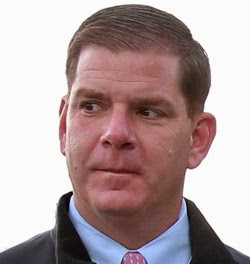Martin Walsh’s Sensible Kind of Unionism
On January 5, 2014, The Boston Globe published an article I wrote on its Opinion/Editorial pages. It has generated a lot of response. You can read the article on the Globe’s Website. I have also included the text below.
 SINCE THE moment Marty Walsh declared for mayor, there has been much discussion about what his long history with construction unions might mean for Boston. He was the head of the Boston Building Trades, representing laborers, electricians, plumbers, and other unions — a resume that raised concerns in some quarters about how he might approach contracts with city employees.
SINCE THE moment Marty Walsh declared for mayor, there has been much discussion about what his long history with construction unions might mean for Boston. He was the head of the Boston Building Trades, representing laborers, electricians, plumbers, and other unions — a resume that raised concerns in some quarters about how he might approach contracts with city employees.
Most commentators took too little account of which union world Walsh comes from. There is a tendency to conflate construction unions with other types of private-sector unions, and with public unions. But each of these three types functions differently, and Walsh’s history with construction unions actually bodes well for taxpayers.
As a representative of employers, I sat in joint union-management meetings with Walsh. Although he and I represented different sides in collective bargaining, I supported his candidacy for mayor. In meetings he was able to find consensus. He in no way fits the stereotype of a construction union leader as a table-banger or bully.
Beyond that, Walsh comes from a world where people are employed only when there is a job that needs doing. Construction unions in Boston and elsewhere are cognizant of the bottom line in these key ways:
■ Our layoff process rarely involves any subsequent arbitration. In over 25 years running my own company and negotiating with the Boston plumbers union, we’ve had exactly one such arbitration. Workers understand that their jobs depend upon performance and the availability of work.
■ Unlike public unions representing teachers, police, and firefighters — and unlike unions in other private-sector industries — construction unions provide no job guarantees. There is no tenure or seniority. As a union employer, I hire the best people and fire those who don’t perform. Period.
■ How much notice must the employer give a union construction worker before layoff? Fifteen minutes. This happened to me 30 years ago, when I was as a young plumber. We were finishing work in a downtown Boston apartment building. At 3 p.m. the boss called: “Hugh, I’m sorry, but we don’t have any work tomorrow.” Two months later, when there was another job, he hired me back.
The construction industry’s emphasis on reliability and performance offers lessons for city government. While the benchmarks for construction work may be more easily measured than those in, say, education (“How many feet of pipe did you put in today?” vs. “How much did your students learn today?”), the construction model of linking employability to performance could prove useful as Walsh deals with public-sector unions.
Consider also the way construction unions deal with wages and benefits. When construction unions reach a wage agreement, it is understood that the money needed to keep pension and health funds solvent is subtracted directly from the total wage package. Negotiating wage increases while treating benefits as an afterthought has led to disaster for many public pension funds. But that isn’t what construction unions and employers do.
Here’s an example. Last summer I helped negotiate a new collective bargaining agreement with the Boston plumbers union. After a series of meetings, we employers agreed to a raise of $2 an hour. This agreement did not presume that additional money would magically appear for benefit programs. If workers wanted to strengthen their health or pension plans, or to operate the union training school in Dorchester, funding would come from their wages. And because we employers hold an equal number of votes on all the union funds’ boards, we ensure a business eye is brought to those decisions.
Sadly, construction unions (and unionized contractor groups like the one I represent) have historically done a poor job helping the public understand that we operate in ways that distinguish us from the common impression of “unions.”
Walsh says he’s interested in strengthening the middle class in Boston. Having sat across the table from him, I have no doubt about his commitment. But once he takes the employer’s seat, the standards he lived by during his years with construction unions will serve Bostonians well.
